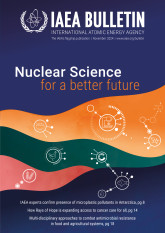Atoms4Food builds on nearly 60 years of experience developed jointly by the IAEA and the Food and Agriculture Organization of the United Nations (FAO) in supporting countries to use nuclear and isotope technology solutions. The Joint FAO/IAEA Centre advances and supports the safe and appropriate use of nuclear and related technologies in food and agriculture and provides the following services:
1. An Assessment Mission to map food security needs and develop a tailored plan to address food security challenges.
2. A Crop Variety Improvement Service to build crop improvement programmes using the nuclear method of plant mutation breeding to create more robust and nutritious crops.
3. A Soil and Water Management and Crop Nutrition Service to use the precision of nuclear and isotopic science to gather information on soil fertility; major crops and their average yield; and the availability of fertilizer and water irrigation systems.
4. An Animal Production and Health Service to provide a scientific assessment of the epidemiological situation of animal diseases; interventions for prevention, diagnosis and control; and laboratory and other veterinary service capacities.
5. An Insect Pest Control Service to tackle insect pests that affect agricultural production by using the nuclear-based sterile insect technique (SIT).
6. A Food Safety and Control Service to assess laboratory capabilities; the capacity to conduct surveillance of food hazards; and authenticity and irradiation applications.
7. A Public Health Nutrition Service to inform impactful nutrition programming using evidence on the nutritional value of foods and diet quality derived from the use of stable isotope techniques.







